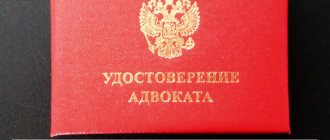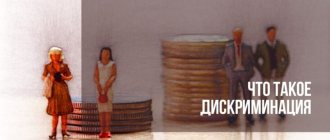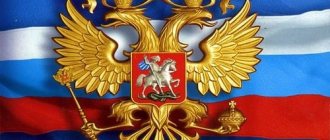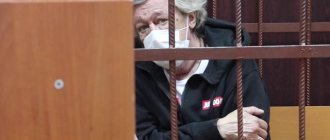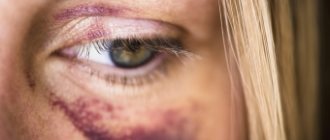Criminal liability for violation of privacy
A citizen’s right to privacy, personal and family secrets, protection of his honor and good name is guaranteed to him by the Constitution of the Russian Federation (Article 23 of the Constitution of the Russian Federation). The collection, storage, use and dissemination of information about the private life of a person without his consent is not allowed (Article 24 of the Constitution of the Russian Federation). Often in the media, mainly through social networks on the Internet, there are cases of deliberate dissemination by some individuals of photographs, videos, informational messages, the content of which violates the right of another person to privacy, personal and family secrets. Often such information is discrediting the citizen. Dissemination of this information is a criminal offense - Article 137 of the Criminal Code of the Russian Federation establishes criminal liability for violation of privacy. The subject of the crime is information about the private life of a person that constitutes his personal or family secret. Information constituting a personal or family secret is understood as information about the area of life of a person or members of his family, which is not subject to control by society and the state, unless it is illegal in nature, is not publicly available and is not made public by the citizen himself. These include, for example, extracts from the medical history, photographs, audio and video recordings, and other materials and documents. This category also includes information provided to the lawyer that is necessary to provide professional legal assistance. The objective side of the crime is expressed in an active form of behavior by: 1) illegal collection of information about the private life of a person, constituting his personal or family secret, without his consent; 2) illegal distribution of such information without the consent of the person; 3) dissemination of this information in a public speech, publicly displayed work or in the media. Collecting information about a person’s private life means any method of illegally obtaining it - eavesdropping, interviewing persons, photographing, audio-video recording of information, familiarization with documents and materials, their theft, copying without the consent of the victim, as well as collection of information in violation of the procedure established by law. Dissemination of information is any illegal or unauthorized communication of information to at least one person. Illegal dissemination of information includes: bringing to the attention of other persons in a public speech (at a meeting, lecture, rally) certain information about the private life of a person who did not give his permission to do so, publication of information, photos, video materials in the media, including including via the Internet. The collection and dissemination of information based on the provisions of the law, for example, criminal procedure, on the police, on operational investigative activities, on the media, does not form the crime under consideration. The corpus delicti is formal. The crime is completed from the moment of carrying out illegal actions to collect or disseminate information about a person’s private life. The subjective side of the crime is characterized by guilt in the form of direct intent. The offender is aware that he is illegally collecting or distributing information constituting his personal or family secret without the consent of the person concerned, or disseminating this information in a public speech, publicly displayed work or the media, and wishes to carry out such actions. Criminal liability for committing this crime begins at the age of 16. If a crime is committed by a person using his official position, then these actions contain elements of the elements provided for in Part 2 of Art. 137 of the Criminal Code of the Russian Federation. This is a person who illegally collects or disseminates information about a person’s private life using his official position. This person does not have to be an official. It is enough that his official position allows him to collect information or use it at his own discretion. In this case, the place of service does not play a role. This may be a state or municipal body, a government organization, or a private organization. Part 3 of Art. 137 of the Criminal Code of the Russian Federation establishes increased criminal liability for the illegal dissemination in a public speech, publicly displayed work, mass media or information and telecommunication networks of information indicating the identity of a minor victim under the age of sixteen in a criminal case, or information containing a description of the information received by him in connection with the crime of physical or moral suffering, resulting in harm to the health of a minor, or mental disorder of a minor, or other grave consequences. The objective side of this crime consists in the public dissemination of information about a minor under sixteen years of age, information related to the criminal case, and containing a description of the suffering of the minor in this regard. A mandatory feature of the objective side of this crime is the occurrence of consequences in the form of harm to the health of a minor, or his mental disorder, or other serious consequences (for example, attempted suicide). Depending on the nature of the crime committed, the sanction of Art. 137 of the Criminal Code of the Russian Federation provides for alternative types of punishment: a fine - the maximum amount of which can be up to 350 thousand rubles or in the amount of the convicted person’s wages (other income) for a period of up to 3 years, compulsory work for up to 360 hours, corrective labor for up to 1 year, forced labor for a term of up to 5 years, as well as imprisonment of up to 5 years. For violation of privacy by a court verdict, compensation for moral damage in favor of the victim may also be recovered from the convicted person.
The article material is taken from open sources
Do you have any questions for your lawyer on this topic?
Ask them right now here, or call us by phone in Moscow +7 (499) 288-34-32 or in Samara +7 (846) 212-99-71 (24 hours a day), or come to our office for a consultation (by pre-registration)!
The Constitutional Court recognized the restriction on movement during the pandemic as legal
The Constitutional Court recognized the decision of the Moscow Region authorities to restrict the movement of citizens during the coronavirus pandemic as consistent with the Basic Law of the country. The corresponding decision was published on the official website of the Constitutional Court.
We are talking about pp. 3 clause 5 of the April decree of the governor of the Moscow region “On the introduction of a high alert regime in the Moscow region.” It prohibits citizens from leaving their place of residence. The exceptions were seeking medical care, blood transfusions, going to the store, walking pets at a distance of 100 meters from home, etc. In addition, it was possible to go out by first obtaining a special pass.
On April 24, one of the residents of Protvino near Moscow (name not specified) left his house and went to one of the city public places, thereby violating the governor’s decree. Local authorities of the Ministry of Internal Affairs drew up a report on him about an administrative violation due to failure to comply with the rules of conduct in case of an emergency or the threat of one.
The protocol was sent to the judge. The Protvinsky City Court of the Moscow Region, in turn, sent the case to the Constitutional Court to check the constitutionality of the provisions of the governor's resolution: the applicant believes that they do not immediately comply with seven articles of the Constitution. We are talking about articles that guarantee respect for human rights and freedoms, as well as which areas are under the jurisdiction of the Russian Federation and which are under the jurisdiction of the constituent entities of the Russian Federation.
Restrictions are for the benefit of citizens
In its decision, the Constitutional Court referred to Art. 2, 7 and 41 of the Basic Law, which state that human life is “the highest good, without which many other goods and values lose their meaning.” It is in connection with these provisions that the authorities take responsibility for ensuring the sanitary and epidemiological well-being of the population, says the Constitutional Court.
- Courts in Moscow began to confirm fines for violating self-isolation
June 22, 14:46 - The Supreme Court explained how to distinguish between criminal and administrative charges for violating self-isolation
April 30, 14:56 - The court recognized as legal fines for violating self-isolation under the capital’s Code of Administrative Offenses
June 3, 16:18
According to the court, the need to protect the life and health of citizens during emergencies “implies the adoption of such legal acts that do not exclude the possibility of restricting human rights and freedoms, including freedom of movement.” The Constitutional Court clarifies: the restriction is permissible insofar as it corresponds to the goals set. It must be proportionate and proportionate to the threat.
The Constitutional Court recognizes the right of citizens to movement, guaranteed by the Basic Law of the country. But he clarifies: in the event of a real public threat, residents must exercise “reasonable restraint” when exercising this right. Temporary restrictive measures taken by the state are “aimed at the self-organization of society before the emergence of a common threat,” the Constitutional Court points out. According to the court, this is one of the manifestations of forms of social solidarity, which is based on mutual trust of the state and society.
In addition, the Constitutional Court notes: restriction of freedom of movement is not the same as restriction of personal freedom.
The court indicated that the introduction of administrative liability for violating self-isolation during an epidemic is “an acceptable balance between protecting the life and health of citizens and the rights and freedoms of a particular citizen.” Such a balance is needed to maintain the functioning of society in the face of the spread of a dangerous disease. Moreover, introducing restrictions in this situation is a task “the state has no right to evade,” the court says.
The court also referred to WHO recommendations, in which the World Health Organization advised limiting contacts between citizens, including introducing quarantine and restricting the movement of people.
Regions versus the center: who should impose restrictions?
The Constitutional Court indicated that the protection of human rights during a pandemic is the joint responsibility of the regions and the federal center. This means that regional authorities can regulate issues that relate to the protection of human rights, as well as protect the population and territories from emergencies and natural disasters.
The court referred to 68-FZ “On the protection of the population and territories from natural and man-made emergencies,” which provides for three modes of operation of bodies involved in the prevention and response to emergencies:
- daily activities - when there is no such threat;
- high alert – when a threat appears;
- emergency situation - when an emergency has arisen and it is necessary to eliminate it.
When authorities impose a state of high alert or emergency, the government commission for the prevention and response of emergency situations and fire safety or a similar official may appoint a leader to deal with the consequences of the emergency. He, in turn, can take additional measures to protect the population, including limiting the access of people and vehicles to territories where there are threats of natural disasters, the Constitutional Court indicated. This official is the head of the region.
- A disabled person is trying to sue for 1 million rubles in compensation for fines
June 3, 9:40 - Ministry of Internal Affairs: living at a location other than your registered address is not a violation of self-isolation
May 9, 2:36 p.m. - A deputy filed a lawsuit against the Moscow City Duma over fines for violating self-isolation
May 18, 18:46
The court also referred to the provisions of the Moscow Region Law “On the protection of the population and territory of the Moscow Region from natural and man-made emergencies.” This act allows the governor to make decisions during an emergency. In addition, the Constitutional Court pointed out that the head of the region adopted the resolution on self-isolation after a similar presidential resolution, by which the head of state obliged the leadership of the constituent entities of the Russian Federation to fight the pandemic.
The Constitutional Court also pointed out that the situation with coronavirus was extraordinary. And although specific federal laws on the division of powers between the center and regions in the fight against the pandemic were adopted after the decree of the head of the Moscow region, the regional authorities took emergency measures to minimize damage to the health and lives of citizens. This means that proactive measures cannot be considered unconstitutional. In addition, the time interval between the introduction of restrictions in the Moscow region and the emergence of full-scale federal regulation was insignificant, the judges pointed out.
In addition, on April 1 of this year, a norm of federal legislation came into force, which made it possible to bring to administrative responsibility for violation of sanitary and epidemiological rules. This became the basis for the introduction of regional regulation, the Constitutional Court indicated.
The court also assessed the proportionality of the adopted restrictions to the impending threat. He pointed out that the reasonableness of the measures taken by the Moscow region authorities is reflected in the established exceptions: the opportunity to go to the store, walk the dog, go to the doctor, etc. At the same time, restrictions changed insofar as the sanitary and epidemiological situation changed. The Constitutional Court also indicated that the courts, when considering cases challenging fines for violating the self-isolation regime, may take into account other valid reasons in order to soften the law enforcement officer’s decision or cancel it altogether.
As a result, the court found the restrictions introduced by the Moscow region authorities to be in accordance with the Constitution.
- Pravo.ru
- constitutional Court
KOMPAS Manual on Human Rights Education with Youth Participation
What are “human rights”?
Human rights are what, according to moral standards, everyone living in the world is entitled to simply by virtue of the fact that they are human. When seeking the realization of our rights, we usually turn to our own government from a moral standpoint: this cannot be done, because it is an intrusion into the sphere of my morality and an insult to my personal dignity. No one, no individual, no government, can ever take away our human rights.
Where did they come from?
They arose because man, in addition to his physical nature, also has a moral and spiritual essence. Human rights are needed in order to protect and preserve the humanity of everyone, in order to provide every person with a decent life - a life that a person deserves.
Why should anyone “should” respect them?
First of all, because human essence also includes a moral component. Most people, if pointed out that they are violating someone's personal dignity, will try not to do it. Generally, people do not want to harm others. However, in addition to the moral sanctions of one's own or another's conscience, most countries in the world now have laws that oblige governments to respect the fundamental rights of their citizens, even if they may not want to.
Who has human rights?
Everything. Criminals, heads of state, children, men, women, Africans, Americans, Europeans, refugees, stateless people, the unemployed, workers, bankers, those accused of terrorist acts, charity workers, teachers, ballet dancers, astronauts...
Even criminals and heads of state?
Everything. Criminals and heads of state are people too. The power of human rights lies in the fact that they recognize everyone as equal in the enjoyment of human dignity. Someone may sometimes violate someone's rights or become a threat to society, and therefore it may be necessary to limit the rights of such people in some way in order to protect the rights of others, but only within certain limits. These limits are defined as the minimum necessary to preserve human dignity.
Why do some groups require special human rights? Does this mean that they have more rights than other people?
No, it does not, but some groups, such as the Roma gypsies in Europe, the Dalits and certain castes in India, have been discriminated against in one society or another for so long that special measures have been required to ensure that they have the same standard of human rights as other people. It would be ridiculous to believe that, after years of entrenched discrimination and stereotyping, outright hatred and social barriers, it would be sufficient to simply grant them generally applicable rights in the belief that this would be sufficient to achieve equality.
Why are we talking about people's rights and not about their responsibilities?
Although some philosophers and NGOs have made strong arguments for the need to determine the extent of human responsibility, and have even presented “codes” and “declarations” in support of this argument, the human rights community as a whole has remained silent on this debate. The reason is that many governments make the “granting” of rights conditional on certain duties imposed on people by the government or ruler, making the very idea of human rights meaningless in the first place. And yet, of course, all of us - individuals and groups of people - must treat the rights of others with full responsibility, not abuse them, but respect them as our own rights. And in this light, Article 29 of the Universal Declaration of Human Rights recognizes that: “1. Every person has responsibilities to society, in which only the free and full development of his personality is possible. 2. In the exercise of his rights and freedoms, each person shall be subject only to such restrictions as are prescribed by law solely for the purpose of securing due recognition and respect for the rights and freedoms of others and satisfying the just requirements of morality, public order and the general welfare in a democratic society.”
Who monitors human rights?
We all need to keep an eye on this. There are laws, both national and international, that limit the freedom of action of governments in relation to their citizens, but unless someone points out to them that their actions violate international norms, governments can continue to violate with impunity. Each of us, as individuals, must not only respect the rights of others in our daily lives, but also carefully monitor the actions of our and non-our governments. Rights protection systems are there for all of us to benefit from.
How can I protect my rights?
Try to draw the attention of others to the fact that your rights have been violated; demand their compliance. Let the other party know that you know they have no right to treat you this way. Highlight relevant articles in the Universal Declaration of Human Rights, the Convention on Human Rights or other international instruments. If there are relevant laws in your own country, refer to them as well. Tell others about what happened: publish a report, write to your member of parliament and head of state, inform human rights non-governmental organizations about it. Ask them for advice. If possible, talk to a lawyer. Make sure the government knows about your actions. Let him know that you are not going to back down. Show support you can count on. Finally, if all else fails, you can take legal action.
How can I apply to the European Court?
The European Convention for the Protection of Human Rights and Fundamental Freedoms sets out procedures for dealing with individual complaints. However, the acceptance of cases for consideration is subject to strict requirements. For example, before filing a case with the European Court, you must confirm that your complaint has already been lodged in the national courts of your country (up to the highest authority!). If you wish to try and believe that your complaint meets the requirements, it can be submitted on official form, which is available from the Secretariat. However, you are strongly advised to seek advice from a lawyer or non-governmental organizations active in this area to ensure that you have a realistic chance of success. Please be aware that a lengthy and complex process may precede a final decision.
From whom should I demand respect for my rights?
You must demand respect for almost all fundamental human rights listed in international agreements from the government of your country, or from government officials. Human rights protect your interests from the encroachments of the state, so you must demand respect for them from the state or from its representatives. If you believe that your rights are being violated, for example by your employer or neighbor, you cannot directly invoke international human rights laws unless your country's government was required to take action to prevent employers or neighbors from doing so. .
Does anyone have a responsibility to protect my rights?
Yes. A right has no meaning unless someone is given the corresponding responsibility and duty. Every person has a moral responsibility not to violate your personal dignity, but the government of your country, having signed international agreements, bears not only a moral, but also a legal responsibility.
Are human rights a problem only for non-democratic countries?
Even today there is no country in the world where all human rights are fully respected. In some countries, violations may occur more often than in others, affecting a larger or smaller part of the population, but any, even a single violation represents a problem that should not arise and which must be addressed. A person whose rights have been violated in a country with an established democracy will hardly be relieved by the fact that in general the human rights situation in his country is better than in other countries of the world.
Have we made progress in combating human rights violations?
Great progress - even if at times it seems like a drop in the ocean. Think about the abolition of slavery, about women being given the right to vote, about countries that have abolished the death penalty, about the release of prisoners of conscience as a result of international pressure, about the collapse of the apartheid regime in South Africa, about the cases heard in the European Court and the laws changed as a result. . Consider that the gradual development of a culture of international communication means that even the most authoritarian regimes today have to take human rights into account if they want to be accepted on the international stage. Many positive results have been achieved, especially over the last 50 years, but much more remains to be done.
Second commentary to Art. 136 of the Criminal Code of the Russian Federation
1. This article acts as a criminal law guarantee of the constitutional principle of equality of citizens (Article 19 of the Constitution of the Russian Federation). The object of the crime is social relations and interests related to the implementation of this constitutional principle.
2. The objective side of this crime is expressed in the commission of an action (inaction) consisting of discrimination, i.e. in violation of the rights, freedoms and legitimate interests of a person and citizen, depending on his gender, race, nationality, language, origin, property and official status, place of residence, attitude to religion, beliefs, membership in public associations or any social groups.
3. The subject of the crime provided for in Article 136 of the Criminal Code of the Russian Federation is a person using his official position, i.e. an official, or a person performing managerial functions in a commercial or other organization, or another employee (of a local government body, a commercial or non-profit organization).
4. Subjective side - guilt in the form of direct intent.
Third commentary to Article 136 of the Criminal Code of the Russian Federation
1. Article 19 of the Constitution of the Russian Federation enshrines the guarantee of equality of rights and freedoms of man and citizen, regardless of gender, race, nationality, language, origin, property and official status, religion, etc. The law prohibits any restrictions on human rights and freedoms based on social, racial, national or other affiliation. Criminal law ensures compliance with the constitutional principle of equality. Any citizen whose equality of rights has been violated can be considered victims.
2. The corpus delicti is formal, the moment of completion is associated with the beginning of the implementation of the actions specified in the law.
3. The objective side is characterized by an action that is regarded as discrimination, i.e. violation of the rights, freedoms and legitimate interests of a person and citizen depending on his gender, race, nationality, language, origin, property and official status, place of residence, attitude to religion, beliefs, membership in public associations or any social groups. A violation of equality consists in the fact that a citizen, on the grounds specified specifically in Art. 136, deprive him of his right or do not provide him with the opportunity to exercise his right or create obstacles in the exercise of this right (for example, illegal dismissal from work in connection with the active participation of a citizen in the activities of one of the public associations, unjustified refusal to rent residential premises on the basis of his attitude to religion and etc.).
4. The subjective side is characterized by guilt in the form of direct intent. The perpetrator realizes that he is violating the equality of citizens and wants to act that way. A mandatory feature of this crime is a motive - an incentive to violate the equality of citizens because of an unfriendly attitude towards his gender, race, nationality, language, origin, property or official status, attitude towards religion, beliefs or membership in public associations.
5. The subject of the crime is a special one, a person using his official position.
It is necessary that the guilty person violates the equality of citizens by using his official position. We can talk not only about an official using his powers, but also about other entities who discriminate within the framework of their official powers. ‹ Chapter 19. Crime against the constitutional rights and freedoms of man and citizenUp Article 137. Violation of privacy ›
